
*
Broadway's favorite self-described "existential problem in tights" is about to pack up the luggage, la-la-la, and move all the way back to Michigan. Elaine Stritch, that is, who arrived here in 1944 and is now giving up her digs at the Carlyle Hotel. Which she celebrated with one last star-studded week at the ground floor café April 2-6. (Read the Playbill report here.) There's nothing like going out to packed houses, filled with friends and fans.
Retirement, or so it seems, at the age of 88. Understandable. Eight-shows-a-week can be rough, even for a youngster of 70. There are times when even a 20-something doesn't feel like dragging themselves in for that night's show, but of course the work ethic of members of the gilded profession always wins out. (Remember the days when everyone played eight performances a week? Even if they had a little sniffle?) When you are in your 80s, though, there surely are some days when you really don't feel up to getting into costume and makeup and singin' and dancin' until 10:45 PM. Eight times a week.
And so Ms. Stritch is throwing in the makeup towel, figuratively. Does this mean retirement? Perhaps — but then again, perhaps not. As long as this lady can remember staging and read cue cards, one suspects that she will be keen to hear the places call. Sitting at home pasting pages into scrapbooks is not for her, I'd guess — although she'd probably be a standout at bingo. Health willing, she'll sooner or later find herself taking juicy featured roles in film and TV land like a latter-day Helen Hayes.
As Stritch takes her leave, for now, we are left with recollections of various performances — some of us with more than others — to remember her by, and a relatively small bunch of cast albums to keep on listening to. Upon consideration of the latter, I thought I'd thumb through my CDs and select a couple of handful of tracks that should perk up listeners and simultaneously give 'em a representative slice of Elaine. Read on!
| |
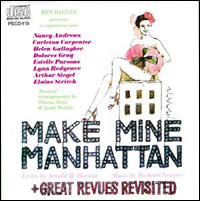 |
|
| Cover art |
Stritch studied the drama at Erwin Piscator's Dramatic Workshop, but first attracted notice in a shoestring revue called Angels in the Wings. The show was a surprise success, due in part to the performances of the now long-forgotten Paul and Grace Hartman. Two Qs: Who won the first Tony Award for Best Actor in a Musical? Who won the first Tony Award for Best Actress in a Musical? A: Paul and Grace Hartman, for Angels in the Wings.
Stritch was given one song, "Civilization" by Bob Hilliard and Carl Sigman, about three educated savages in a bamboo tree who sing "Bongo bongo bongo I don't wanna leave the Congo." Pure nonsense, but Stritch sold it. The show went unrecorded, but 30 years later Stritch sang it on Ben Bagley's "Make Mine Manhattan + Great Revues Revisited" [Painted Smiles]. If you can't find that — and it is rather difficult to find nowadays — Stritch also performs it on the cast album of Elaine Stritch At Liberty [DRG] with seemingly all the energy she possessed 55 years earlier. It isn't quite as pert as the 1977 recording, though, so I prefer the earlier one.
Visit PlaybillStore.com to view theatre-related recordings for sale.
| |
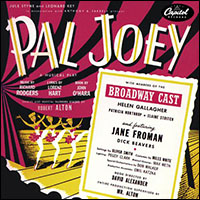 |
|
| Cover art |
Stritch graduated to a steady job in 1950 as standby to Ethel Merman in the original Broadway company of Irving Berlin's Call Me Madam. Which meant not performing the Irving Berlin score, as Merman was steady as a rock. (Sniffles? Flu? Severe illness? Merman did not believe in calling in sick.) Stritch — who was 17 years younger than Merman — did get to play the role for 50 weeks when she took out the national tour.
Just before the tour, she had a featured role in Jule Styne's 1952 revival of Rodgers & Hart's Pal Joey. She played Melba, the newspaper reporter who comes on for a scene and a song. "Zip" — relating a supposed interview with ecdysiast Gypsy Rose Lee — has always been one of the highlights of the show. Stritch's rendition is, not surprisingly, raucous and borders on strip tease. You can find it on the 1952 cast album of Pal Joey [Capitol].
Visit PlaybillStore.com to view theatre-related recordings for sale.
| |
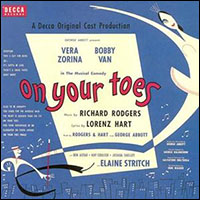 |
|
| Cover art |
All right, "You Took Advantage of Me" is not from On Your Toes. But the highly successful 1952 Pal Joey revival spawned a lukewarm 1954 revival of the 1936 Rodgers & Hart hit. Vera Zorina, who had played leading lady Vera Barnova in the 1937 London production and the 1939 film version, here reprised her role. (OK, let's get this right: Tamara Geva, who created the role on Broadway, was the first wife of On Your Toes choreographer George Balanchine. Zorina, after London, became the third Mrs. B. They divorced in 1946 — when Zorina married record producer Goddard Lieberson — but this didn't stop her from working with Balanchine again on the 1954 revival.)
Zorina starred opposite Bobby Van, from Hollywood, who sure didn't measure up to Ray Bolger. But the entire enterprise fell flat. George Abbott (who produced and directed the revival) hired Stritch as what must have seemed like some kind of built-in reminder of the good times of Pal Joey, but it didn't help. Elaine played Peggy Porterfield, the comedy relief. They — presumably Rodgers, who was very much in evidence — decided to interpolate "You Took Advantage of Me," a standard from the 1928 R & H musical Present Arms! Stritch's rendition is, surprisingly, raucous and borders on strip tease (in a dive). Not much help, as the show closed in eight weeks. But the track on the 1954 cast album — with a wild vocal arrangement by Portia Nelson and a jazz-infused orchestration by Red Ginzler — gives us a good audio snapshot of Stritch at 30.
Visit PlaybillStore.com to view theatre-related recordings for sale.
| |
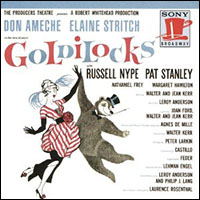 |
|
| Cover art |
Stritch had what was arguably her finest role — as Grace, the owner of the diner — in William Inge's 1955 drama, Bus Stop. But that wasn't a musical. She got her first chance at stardom in 1958 with Goldilocks, with music by Leroy Anderson and book and lyrics by Walter & Jean Kerr. Walter, who was better known as a theatre critic for the Herald Tribune, also directed; Agnes de Mille choreographed. Goldilocks had several charms — including a sometimes sprightly score and winning performances from the secondary couple, Pat Stanley and Russell Nype (both of whom won themselves Tonys in the process). But the show, a supposed spoof of the silent film era, was done in by the material. Struggling to salvage the show, they fired one of the two stars during the tryout — not Stritch, the other one. But to no avail; the show died after 20 weeks. Even so, the original cast album [Sony Broadway] gives us two lovely servings of Elaine-as-leading-lady.
"Who's Been Sitting in My Chair?" draws on the old Goldilocks tale — hence the show's title — and included a dance for the leading lady and a stuffed bear. "I Never Know When," on the other hand, is a dead-of-the-night torch song, and one which deserves more of a life than it has had. Stritch is smoky and wistful and immensely winning. Before you leave Goldilocks, if you happen to stop by to hear these two tracks, make sure you listen to the perky overture by Phil Lang (with sections by Anderson). And the big dance number "The Pussy Foot," which is so delectable that it won Ms. Stanley her Tony.
Visit PlaybillStore.com to view theatre-related recordings for sale.
| |
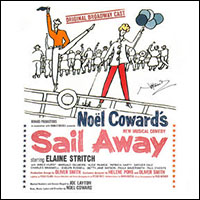 |
|
| Cover art |
Opportunity knocks twice, they say; Stritch, at least, was to have two original musical comedies written around her. (If either had been successful, there would no doubt have been more.) The knockee in this case was Noël Coward, no less, with a vapid shipboard tale called Sail Away. Struggling to salvage the show, they fired one of the two stars during the tryout — not Stritch, the other one. But to no avail; the show died after 21 weeks. The original cast album [DRG] is less felicitous than Goldilocks, but it is good for occasional listening. For our purposes, I select two tracks — Stritch's opening number and her closing number. Neither are especially good songs. "Come to Me" shows Stritch thoroughly in charge, at least. Her character, a cruise ship hostess, is assuring passengers that she will see them through no matter how rocky the cruise becomes. The way she sings it, though, suggests that she is going to personally entertain the theatergoers; no matter if the writer and director (i.e., Coward and Coward) are thoroughly stranded. And listen to what she does with "Why Do the Wrong People Travel?" The song is a one-track list song which only intermittently hits. No matter; Stritch sings it like it is some Irving Berlin 11-o'clock number, and earns the built-in encore.
What of the romantic ballad, "Something Very Strange (Is Happening to Me)"?, people familiar with the cast album might ask. I'm afraid I've never found it effective. Stritch sings it well enough, but she doesn't sound real to me; perhaps because the song was written for another character altogether. While you're listening, though, you might want to stop for a non-Stritch song, "Call Me." This is Grover Dale (who was to become a choreographer) and Patricia Harty, as the young lovers, with a delightful Irv Kostal arrangement that makes Coward sound almost contemporary. Speaking of Kostal, I would suggest that you simply avoid the 1962 original London cast album. Producer Harold Fielding refused, at the last minute, to pay Kostal for the use of his New York charts; Kostal, thus, refused to allow Fielding to use them. Wally Stott — who later became Emmy-winning arranger Angela Morley — rushed through new orchestrations, but they have none of the sparkle of the originals.
Visit PlaybillStore.com to view theatre-related recordings for sale.
The failure of Goldilocks and Sail Away more or less scuttled Stritch's chances at musical comedy stardom. She returned to Broadway in 1963 with Who's Afraid of Virginia Woolf? Uta Hagen only played six performances a week — one a day was more than enough — so the producers hired separate actors to play Martha and George at the matinees. Stritch came in when the original matinee Martha left. It is said that she was very good, and I would expect she was. She soon left for a new play, which folded on the road. From 1963 through the rest of the century, she would return to Broadway only thrice.
Next week: Stritch's indelible tracks from Company onward. Click here to read Part Two!
(Steven Suskin is author of "Show Tunes," "The Sound of Broadway Music: A Book of Orchestrators and Orchestrations," "Second Act Trouble," the "Broadway Yearbook" series and the "Opening Night on Broadway" books. He also pens Playbill.com's Book Shelf and DVD Shelf columns. He can be reached at [email protected].)
Visit PlaybillStore.com to view theatre-related recordings for sale.










